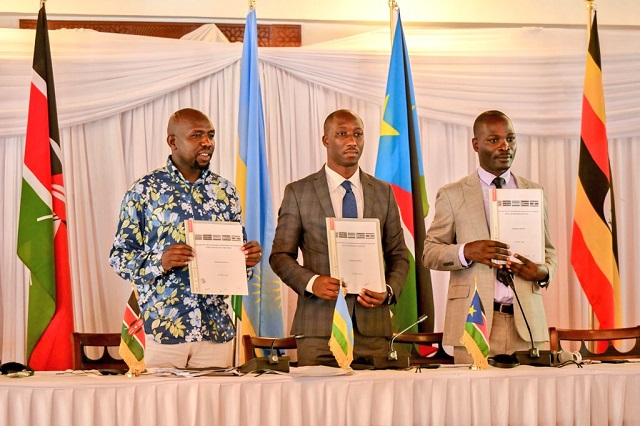
MOMBASA, Kenya | Xinhua | Four African transport ministers agreed on Friday to expedite the completion of the remaining sections of the high-speed Standard Gauge Railway (SGR) from Naivasha, Kenya, to regional countries.
The ministers of transport from Kenya, Uganda, the Democratic Republic of the Congo (DRC), and Rwanda, who met in the Kenyan coastal city of Mombasa, also agreed to develop a roadmap to fast-track the SGR’s implementation.
The ministers resolved to jointly mobilize resources for extending the SGR from Kenya’s Naivasha to Uganda, Rwanda, South Sudan, and the DRC.
“They committed to deploring the possibility of Rwanda joining the existing working framework between Uganda and the contractor Yapi Merkezi on the update of the feasibility study of the Mirama Hills-Kigali section to ensure harmonization of specifications,” the ministers said.
In addition, the meeting further sought to harmonize the planning and development of inland water transport infrastructure in order to provide seamless multimodal transport services and speed up the review of the Tripartite Agreement on water transport on Lake Victoria.
Kenya aims to establish special economic zones along the corridor that will turn areas with stop stations into hubs of economic activity, in addition to ensuring smooth cross-border movement of people and goods, by utilizing private sector partnerships in the extension of the SGR line.
During the meeting, Kenya committed to beginning the Naivasha-Kisumu-Malaba line’s construction by December, and Uganda promised to complete its contract by May 31.
The regional ministers who met under the Northern Corridor Integration Projects (NCIPs) resolved to establish a framework that facilitates cross-border maintenance of the SGR assets and facilities.
They also committed to harmonizing the planning and development of inland water transport infrastructure, including the development of navigation charts, to provide seamless multimodal transport services within the NCIP. ■
 The Independent Uganda: You get the Truth we Pay the Price
The Independent Uganda: You get the Truth we Pay the Price





